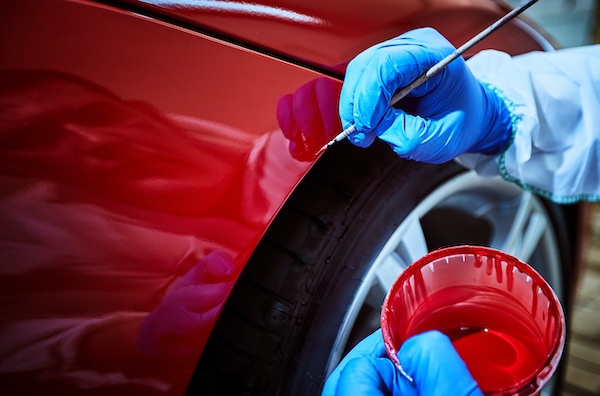Posted on: 3/21/2022

If you've been in a vehicle collision and need a body repair, chances are you aren't sure yet of the extent of work you'll need or what collision repair services entail. Let's take a look at some of the most common collision repair services and when they might be needed. Typical collision and auto body repair services include: Body Work In the unfortunate case that you've been in a vehicle collision, give our experts a call for professional body work. The collision mechanics at our shop can remove dents, fill, grind, and sand affected areas, as well as matching paint. Our goal is to restore your vehicle back to its original state to get you back on the road safely. Framework In the instance of a collision, sometimes the frame of your vehicle can become damaged. The frame is essentially the main structure of a motor vehicle and holsters all other components. Although the frame is made of very strong metal, it can often be damaged during accidents. When the frame ... read more
Posted on: 2/25/2022

Whenever you get into a vehicle accident, one of the following steps is to look for collision repair. Friends, family, and colleagues have probably advised you to get multiple quotes. Why is that? You might wonder, "why can't it cost the same at every shop?" Below are some areas that can affect your repair estimate: LABOR (Technician knowledge and expertise) PARTS, TOOLS, AND EQUIPMENT (Replacement parts and materials and shop equipment) CONVENIENCE AND AVAILABILITY (Shop location, popularity, and seasonality) LABOR A very important factor that a collision/auto body repair shop uses to assess their estimate is their staff's skills and experience. A person with little experience may work at a slower pace or be done messily at a faster pace. However, shops that invest in quality technicians with education and certifications utilize more skilled labor to restore your car to its previous condition. Therefore, they will charge a higher price for the fix to ... read more
Posted on: 1/31/2022

The road can be dangerous for drivers, even more so during certain times of the day, week, or year. Wherever you're driving, you need to be aware and conscious of your surroundings. Besides other cars around you, you should be mindful of pedestrians, bikers, wildlife, and weather conditions as they can cause accidents as well. We thought we'd share the busiest driving times to drive, where you need to be extra careful. Time of the Day = Nighttime There's no question that driving becomes more challenging in the evening and night because of visibility. At night, many drivers have difficulty seeing through the light glare on their windshield. Also, some drivers make the mistake of forgetting to turn their headlights on, increasing their likelihood of an accident. Day of the Week = Saturday Although most people may think weekdays are busiest with more traffic during rush hour, Saturday is the day of the week that has the most automotive collisions. It makes sense bec ... read more
Posted on: 12/23/2021

The mall or grocery store parking lot can be extra dangerous for your vehicle during this time of year. It's there where your car is most exposed to possible bumper damage or dents. There are many hazards your vehicle must overcome in the parking lot, and the one most people don't talk about is shopping carts. Whether they are stationary at the return post or on the move, shopping carts are a common cause of body damage. If you're someone who has suffered from this type of collision, there are actions that you can take to ensure you have a stress-free and quick restoration process. Step 1 - Take Pictures of the Damage One of the first things you should do after any vehicle incident is capture pictures of the affected parts. Those photos can come in handy for your estimate at db Orlando Collision Inc. Step 2 - Assess the Situation In most circumstances, businesses are generally not liable for accidents that occur with their shopping carts in their parking lot. It ... read more
Posted on: 11/29/2021

Scratches on your vehicle's body don't just make the appearance of your car look bad, but they can also start up a number of other side effects if not treated quickly. After examining the marks, you might wonder whether you should have them removed or just save some money by ignoring them. Let's dive deeper into why removing car scratches is necessary to preserve your car's look and overall health. The truth is car scratches can allow outside elements to get into the deep folds of your vehicle's bodywork. Whenever we drive, thousands of particles of water, dirt, and debris graze our cars. And when we have scratches or marks, this debris can get into the metal and produce rust. Not removing a car scratch will start a bad habit. If you justify putting off your first car scratch or dent, you're more likely going to make excuses for any other damage that comes after that. Before you know it, you're going to be neglecting maintenance services. Lo ... read more
Posted on: 10/27/2021

Ceramic coating is a silica-based liquid polymer chemical sealant that can withstand external threats to your vehicle's exterior paint. Another common term for it is nano-ceramic coating. The ceramic coating chemicals form a layer on top of your vehicle's natural coating and protect it from scratch marks, dents, etc. The ceramic coating is hydrophobic, meaning it also deters water. This solution is applied by hand, usually by a professional, and can be effective for up to several years instead of wax. Pros of Ceramic Coating Paint Protection - Everyday driving exposes your car to many airborne contaminants that endanger your car's exterior appearance. The ceramic coating further ensures the original paint is shielded from dirt, debris, or anything that can cause accidental marks, etc. UV Ray Safety - Parking in the scorching sun can have adverse effects on your vehicle paint. Ceramic coating can tackle those harmful UV rays and preserve your car's natural pai ... read more
Posted on: 9/28/2021

Cars have been a part of American culture since the very beginning. Whereas automobiles account for most of our daily transportation today, they are also the cause of thousands of fatalities of car crashes every year. Understanding the most common causes of car crashes is vital in making sure you play your part in not causing one in the first place. Here are the top 4 common causes of automobile accidents in the US. #1: Distracted Driving Distracted driving has always been the number one cause of traffic accidents, but it has only worsened due to the creation of the smartphone. Unfortunately, it is no longer uncommon to drive past someone who's driving while scrolling on an app or texting their friends. The hazards associated with distracted driving are that the more you do it and get away with it, the more inclined you are to do it. You may think you can multitask behind the wheel, but calling, texting, eating, reading, and grooming while driving are all very dangerous a ... read more
Posted on: 8/30/2021

Car accidents can be catastrophic, stressful, and scary. Most drivers are likely to get into an accident at least once in their lifetime, so it's probably important to know exactly what steps to take at the scene and in the days following the crash. It's common for most people to feel shaken up whenever an accident happens, but the most important tip to take away is to remain calm. If you’re involved in an automobile accident, whether you’re at fault or not, there are certain things you should always do to protect yourself. Here are the actions you should take immediately following a wreck: Step 1: Safety FIRST If the incident is minor, consider moving the vehicle out of traffic to a safe location. You should turn off your vehicle and turn on your hazards to alert other drivers. If you or your passengers are severely injured, please call for emergency assistance immediately. Step 2: Call the Police You should phone the police, even if the accident is mi ... read more
Posted on: 7/26/2021

Your vehicle bumper is designed to take many obstructions, which leads to dings and dents over time. Sometimes, it seems like a small thing for many vehicle owners and not something that should justify a visit to a local auto body shop. However, you'd be doing yourself a favor by taking your car in to be fixed because your car's bumper plays several roles that can lead to other significant problems if not taken care of. Here are the negative effects of ignoring bumper damage: Bumpers Lessen Impact On Your Car When you experience a collision, there's a good chance that your bumper is the first thing that makes contact. Bumpers are built with solid materials to handle the force straight-on and minimize the impact on the rest of the car. This is especially true in cases where you have fender benders and other more minor crashes. When your bumper is not in decent shape, the damage to your car body and other areas can be affected easier. Reduces Resale Value O ... read more
Posted on: 6/24/2021

The appearance of your vehicle is one of the features that prompted you to make the purchase. We all want to be seen driving a spick-n-span car with no blemishes on the paint or body. That's why most drivers feel tacitly obliged to repair dents and dings after getting involved in minor knocks. Other auto body repairs might require a complete paint job. For instance, if you plan to resale the car or simply upgrade its appearance, you'll need an entire paint job. What most drivers find confusing is deciding whether to have a full or partial paint job to repair their vehicle's body. Well, it depends on the extent of damage to the body and the owner's personal preference. Below, we discuss in-depth the circumstances that warrant a whole paint job. Safety – Your vehicle's paint does more than just improving its appearance. It is designed to protect the body from structural damage. The steel used in their manufacture corrodes and weakens when exposed to eleme ... read more